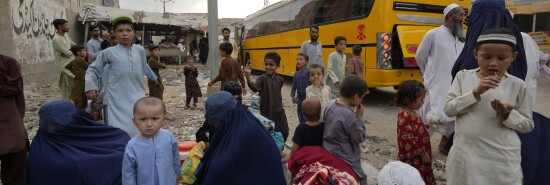
Americans urge Pakistani leaders to halt deportation of Afghans with US ties
Beth Bailey
Video Embed
Pakistan has begun a phased approach to ridding its country of around 3.7 million Afghan refugees. In the first phase, 1.7 million illegal refugees must depart Pakistan by Nov. 1 or face forced deportation. The country’s Caretaker Interior Minister Sarfraz Bugti told the Telegraph that the second phase will target “those with Afghan citizenship,” while the third phase will expel Afghans with “proof of residence cards.”
Afghans to be deported could include those who have valid paths to citizenship in the United States through the special immigrant visa program, as well as refugees referred to the U.S. Refugee Admissions Program, and those who have petitioned the U.S. for humanitarian parole.
IVY LEAGUE SCHOOLS LOSE DONORS AMID ANTI-ISRAEL STUDENT ACTIVISM
#AfghanEvac coalition President Shawn VanDiver told the Washington Examiner that volunteers within the coalition have already documented multiple cases of legal refugees with pathways to safety in the U.S. being harassed due to their nationality. “We’ve seen arrests of SIV applicants, we’ve seen arrests and evictions of P-1 and P-2 refugees, and it’s because landlords and others are being encouraged to report [Afghans],” VanDiver said.
VanDiver and a huge swath of leaders in the resettlement and relocation realms have written an open letter to Pakistani leaders asking that they amend their “deeply troubling and concerning” policy of deporting vulnerable Afghans. To date, VanDiver says that more than 140 people have signed on to the letter, including former chiefs of mission, a former ambassador to Pakistan, senior U.S. government personnel, and multiple military generals.
While urging Pakistan to remember the accords, to which it is a signatory, that require it to treat refugees and asylees humanely, the letter focuses primarily on policies relating to the treatment of at-risk American allies, including “former interpreters, journalists, women leaders, and other professionals who face significant risk if returned to Afghanistan.” #AfghanEvac’s primary goal is an “immediate halt” on the deportation of Afghans with legal pathways to the U.S. VanDiver estimates that this includes around 20,000 people eligible for refugee referrals and an unknown number of SIV applicants and humanitarian parole petitioners.
The letter provides previously unpublished details about the Pakistani government’s role in the slow processing of USRAP applications. Though the State Department has taken much of the blame for processing failures, VanDiver said that he has witnessed “at the very highest levels” that the “State Department is engaged” in assisting refugees. Roadblocks, according to #AfghanEvac’s letter, have emanated from Pakistan, which failed to support the creation of a Resettlement Support Center where USRAP applicants could undergo 12-18 months of processing. Without a Resettlement Support Center in Pakistan, only about 27% of 26,932 applicants had been processed as of August.
Additional legal setbacks plague many Afghan families who hope to achieve safety in the U.S. VanDiver said people in Pakistan have “weaponized the visa renewal system” to make money from refugees. The #AfghanEvac letter also describes “unjust and frequently corrupt practices surrounding exit permits,” which are “disproportionally harmful to women and children.” As one example, the letter explains that Afghan children who were allowed to enter Pakistan without a visa are being “denied exit permits on the basis of not having” a visa. Denials are also being issued for infants who were never issued entry visas because they were born in Pakistan. Exit visa problems have thus far been unresolvable. VanDiver said Afghan families “who have [boarding] foils in their passports” are “routinely” unable to leave on chartered State Department flights because their children do not have exit visas.
The Pakistani Embassy did not respond by the time of publishing to requests for comment regarding complications surrounding exit visas or the Pakistani government’s intended course of action for allies with legal U.S. pathways underway.
CLICK HERE TO READ MORE FROM THE WASHINGTON EXAMINER
The State Department told the Washington Examiner it is “concerned by Pakistan’s announcement” regarding expulsions and is “monitoring the situation closely.” The State Department says it “remains committed to processing Afghans eligible for immigration or resettlement” and added that Afghans eligible for relocation flights “should be documented with valid Pakistani visas.” Possessing a valid visa should protect Afghans from Pakistan’s first phase of deportations.
With confusion over the remaining phases of Pakistan’s plans for refugees, and considering that the Taliban’s killings of its former enemies continue unabated, it is particularly urgent that Pakistan cease the harassment of Afghans who fled to its borders for safety. Every relevant organization must put pressure on the Pakistani government to ensure that barriers to departure are removed and resettlement facilities can be created to help U.S. allies safely and effectively begin refugee processing and exit to a country where their lives are not at serious risk.
Beth Bailey (@BWBailey85) is a freelance contributor to Fox News Digital and the co-host of The Afghanistan Project, which takes a deep dive into the tragedy wrought in the wake of the U.S. withdrawal from Afghanistan.
